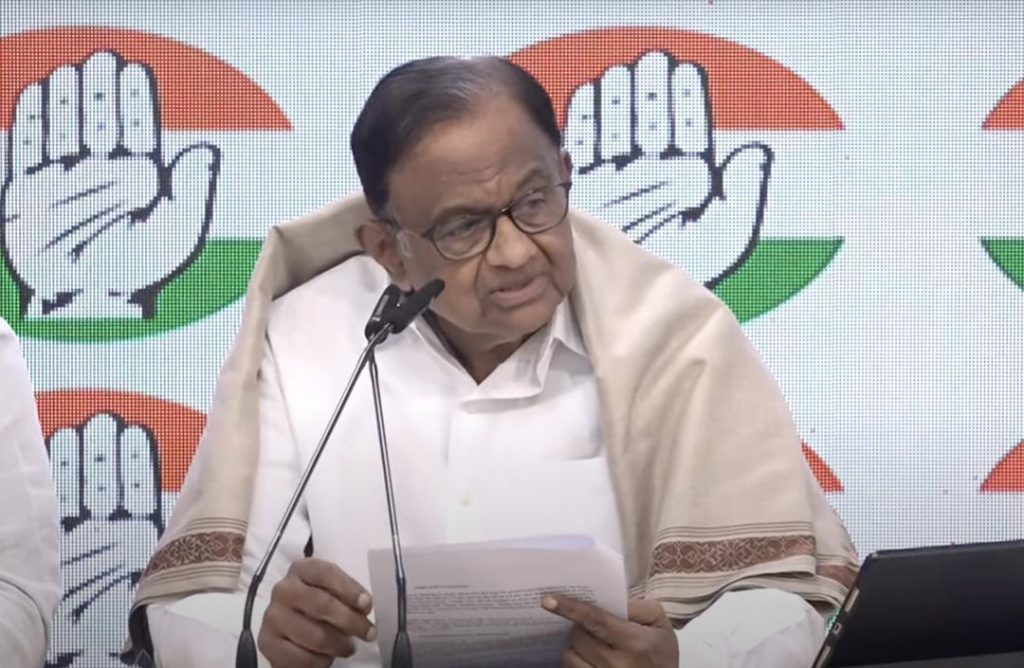
Not Sure if INDI Alliance is Still Intact, Seems Frayed: Chidambaram
In a recent statement, senior Congress leader P Chidambaram hailed the Bharatiya Janata Party (BJP) for its organizational prowess, acknowledging that it is a formidable force in Indian politics. However, he raised concerns about the INDI Alliance, an opposition bloc formed to challenge the BJP’s dominance, stating that he is “not sure” if the alliance is still intact.
The INDI Alliance, comprising various opposition parties, was formed in 2019 with the aim of presenting a united front against the BJP in the Lok Sabha elections. The alliance, which includes parties such as the Congress, the Nationalist Congress Party (NCP), the Rashtriya Janata Dal (RJD), and the Dravida Munnetra Kazhagam (DMK), among others, has been grappling with internal differences and power struggles.
Chidambaram’s remarks come at a time when the INDI Alliance is facing challenges in maintaining its cohesion, with some parties expressing discontent with the alliance’s leadership and others demanding more representation in the decision-making process. The Congress leader’s comments have sparked concerns about the future of the alliance, which has been seen as a crucial counterforce to the BJP’s growing influence in Indian politics.
In his statement, Chidambaram acknowledged the BJP’s organizational might, saying, “There has been no political party so formidably organised as the BJP. In every department, it’s formidable.” He praised the party’s ability to mobilize its cadre and resources, which has enabled it to maintain its grip on power at the Centre and in many states.
However, Chidambaram’s praise for the BJP was tempered by his concerns about the INDI Alliance, which he described as “frayed.” He expressed uncertainty about the alliance’s future, saying, “I’m not sure if the INDI Alliance is still intact.” His comments suggest that the alliance is struggling to maintain its unity and coherence, which could have significant implications for the opposition’s ability to challenge the BJP’s dominance.
Chidambaram’s concerns about the INDI Alliance are not unfounded. The alliance has faced several challenges since its formation, including internal power struggles, ideological differences, and conflicting priorities. The Congress, which is one of the key parties in the alliance, has been grappling with its own internal issues, including the leadership crisis created by the Rahul Gandhi’s resignation as party president.
The INDI Alliance has also faced criticism for its lack of cohesion and unity, with some parties accusing others of not contributing equally to the alliance’s efforts. The alliance’s leadership has been criticized for its inability to provide a clear vision and strategy for the opposition’s political campaign, which has led to a lack of enthusiasm among the opposition cadre.
Despite these challenges, the INDI Alliance remains a crucial counterforce to the BJP’s dominance. The alliance has the potential to bring together a broad range of opposition parties and forces, which could create a formidable force against the BJP. However, for this to happen, the alliance needs to overcome its internal differences and power struggles, and present a united front against the BJP.
In conclusion, Chidambaram’s remarks about the INDI Alliance have raised concerns about the alliance’s future and its ability to challenge the BJP’s dominance. While the alliance has the potential to be a powerful force against the BJP, it needs to overcome its internal differences and power struggles to achieve its goals. The opposition parties need to work together to present a united front against the BJP, and to provide a clear vision and strategy for the country’s political future.






